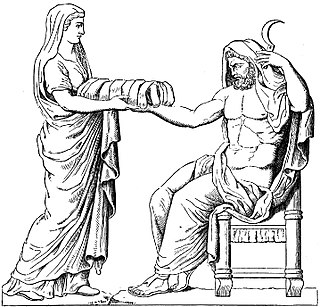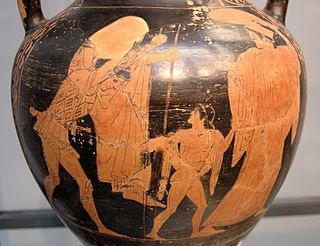
The Titans and Titanesses are a race of deities originally worshiped as part of Ancient Greek religion. They were often considered to be the second generation of divine beings, succeeding the primordial deities and preceding the Olympians, but also included certain descendants of the second generation. The Titans include the first twelve children of Gaia and Uranus, who ruled during the legendary Golden Age, and also comprised the first pantheon of Greek deities.

Rhea is a character in Greek mythology, the Titaness daughter of the earth goddess Gaia and the sky god Uranus as well as sister and wife to Cronus. In early traditions, she is known as "the mother of gods" and therefore is strongly associated with Gaia and Cybele, who have similar functions. The classical Greeks saw her as the mother of the Olympian gods and goddesses, but not as an Olympian goddess in her own right. The Romans identified her with Magna Mater, and the Goddess Ops.

Ptolemy XV Philopator Philometor Caesar, better known by the nicknames Caesarion and Ptolemy Caesar, was the last Pharaoh of Egypt, reigning with his mother Cleopatra VII from 2 September 44 BC until her death by 12 August 30 BC and as sole ruler until his death was ordered by Octavian, the later Roman emperor Augustus. Caesarion was the eldest son of Cleopatra and possibly the only biological son of Julius Caesar, after whom he was named. He was the last sovereign member of the Ptolemaic dynasty of Egypt. In addition to being co-ruler of Egypt as Pharaoh with his mother, he was expected to be his father's successor as the Roman emperor.

In Greek mythology, Peneus was a Thessalian river god, one of the three thousand Rivers (Potamoi), a child of Oceanus and Tethys.
Deimos is the god of terror in Greek mythology. He was a son of Ares and Aphrodite, and the twin brother of Phobos; Deimos served to represent the feelings of dread that befell those in the midst of battle, while Phobos personified feelings of fear and panic. Like Phobos, Deimos served as one of Ares’ attendants, and the two of them would often accompany their father as he rode into battle in his chariot, alongside Enyo, goddess of war and bloodshed, and Eris, goddess of strife. Deimos, the smaller of Mars’ two moons, is named after this mythological figure. The god’s Roman equivalent was Formido or Metus.

Ascanius a legendary king of Alba Longa and is the son of the Trojan hero Aeneas and either Creusa, daughter of Priam, or Lavinia, daughter of Latinus. He is a character in Roman mythology, and has a divine lineage, being the son of Aeneas, who is the son of the goddess Venus and the hero Anchises, a relative of the king Priam; thus Ascanius has divine ascendents by both parents, being descendants of god Jupiter and Dardanus. He is also an ancestor of Romulus, Remus and the Gens Julia. Together with his father, he is a major character in Virgil's Aeneid, and he is depicted as one of the founders of the Roman race.

In Greek mythology, Eurycleia, or Euryclea, is the daughter of Ops and granddaughter of Peisenor, as well as the wet-nurse of Odysseus.

In ancient Roman religion, Ops or Opis was a fertility deity and earth goddess of Sabine origin.
A matronymic is a personal name based on the given name of one's mother, grandmother, or any female ancestor. It is the female equivalent of a patronymic. Around the world, matronymic surnames are far less common than patronymic surnames. In some cultures in the past, matronymic last names were often given to children of unwed mothers. Or if a woman was especially well known or powerful, her descendants might adopt a matronym based on her name.

In Greek mythology, Pontus was an ancient, pre-Olympian sea-god, one of the Greek primordial deities. Pontus was Gaia's son and has no father; according to the Greek poet Hesiod, he was born without coupling, though according to Hyginus, Pontus is the son of Aether and Gaia.
Clopas is a figure of early Christianity. The name appears in the New Testament, specifically in John 19:25:
Near the cross of Jesus stood his mother, his mother's sister, Mary the wife of Clopas, and Mary Magdalene.

Pavlos, Crown Prince of Greece, RE is the eldest son and second child of Constantine II, the last King of Greece from 1964 to 1973 and his wife, Anne-Marie of Denmark. Pavlos was heir apparent to the throne of Greece and was its crown prince from birth, remaining so during his father's reign until the monarchy's abolition. As a male-line descendant of Christian IX of Denmark, he is also a Danish prince.

In Greek mythology, Aether is one of the primordial deities. Aether is the personification of the "upper sky". He embodies the pure upper air that the gods breathe, as opposed to the normal air breathed by mortals. Like Tartarus and Erebus, Aether may have had shrines in ancient Greece, but he had no temples and is unlikely to have had a cult.

Samuel Henry John Worthington is an English-born Australian actor and writer. He portrayed Jake Sully in the 2009 film Avatar, Marcus Wright in Terminator Salvation, and Perseus in Clash of the Titans as well as its sequel Wrath of the Titans. He then transitioned to more dramatic roles, appearing in Everest (2015), Hacksaw Ridge (2016), The Shack, and Manhunt: Unabomber. He also played the main protagonist, Captain Alex Mason, in Call of Duty: Black Ops.
Ioannis Kolokotronis, or Gennaios Kolokotronis as the other were calling him was a Greek warrior of the Greek War of Independence, general and the 14th Prime Minister of Greece. He was born at Stemnitsa, Arcadia, but he grew up at Zakynthos. He was a son of Theodoros Kolokotronis and his mother was Aikaterini Karousou . He acquired the nickname "Gennaios" during the Greek War of Independence in which he fought valiantly despite his youth. He took part at the Siege of Tripolitsa, together with his father.
An Earth goddess is a deification of the Earth. Earth goddesses are often associated with the "chthonic" deities of the underworld.
In Greek mythology, Eurypylus was a Thessalian king.












